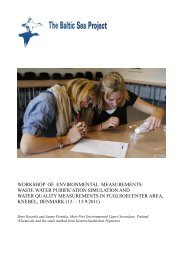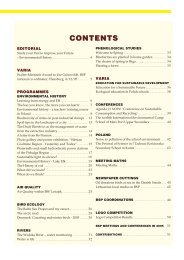newsletter_2008_1.pdf - 5.84 MB - The Baltic Sea Project
newsletter_2008_1.pdf - 5.84 MB - The Baltic Sea Project
newsletter_2008_1.pdf - 5.84 MB - The Baltic Sea Project
Create successful ePaper yourself
Turn your PDF publications into a flip-book with our unique Google optimized e-Paper software.
School in Gdynia<br />
X Secondary School in Gdynia has existed since 1992 –<br />
this year our school is celebrating its 15th anniversary. Our<br />
school was established as a result of the transformation of<br />
the pedagogical school for teachers. It inherited the traditions<br />
and the name of patriotic teachers, which clearly<br />
refers to the school’s history. <strong>The</strong> building itself housed<br />
pedagogical schools for over 50 years. All of them were<br />
very respected and popular among students. Today, our<br />
school has earned respect as a well-organized institution,<br />
one of Gdynia’s top secondary schools. It has numerous<br />
didactic and educational achievements on its scorecard, as<br />
well as a special ambience. We are proud of the fact that<br />
100% of our graduates have continued their studies in<br />
various universities and colleges.<br />
What do we do as part of BSP?<br />
Since we joined the <strong>Baltic</strong> <strong>Sea</strong> <strong>Project</strong> two years ago, participation<br />
in the programme has become one of the most<br />
important environment-friendly activities that take place<br />
in our school. What is more, it plays a significant part in<br />
international cooperation and among schools within the<br />
Polish borders.<br />
We have been trying to take advantage of the location of<br />
our school - the coastline of the <strong>Baltic</strong> <strong>Sea</strong>. <strong>The</strong> majority<br />
of our activities are connected to learning about the sea<br />
ecosystem, a place of extraordinary flora and fauna, as<br />
well as an area exposed to the influence of anthropological<br />
activities. We act under the school name: <strong>The</strong> Club of<br />
<strong>Baltic</strong> Researchers.<br />
We have monitored the seacoast systematically – observing<br />
the condition of the beaches and organisms dwelling<br />
in selected sections of the coastline. We have cooperated<br />
with the <strong>Sea</strong> Station in Hel, along with students and doctors<br />
from the oceanography faculty of Gdańsk University.<br />
We have realized projects on the biodiversity of the maritime<br />
belt area. We have organized classes in the Hel sealarium,<br />
where our students work as volunteers. For the last<br />
two years we have taken part in the students’ field workshop<br />
at the mouth of the Rewa River, where we recognized<br />
various species and observed the migration of ichthyofauna.<br />
We have reached the local fishermen and gathered<br />
information about the condition of the water in the gulf<br />
from them. We also asked for the presence of endangered,<br />
rare or even new, invasive species.<br />
Not only do we actively participate in scientific conferences<br />
WHO ARE WE?<br />
concerning sea matters, such as “<strong>Sea</strong> mammals and man in<br />
a coastal ecosystem - is coexistence possible?”, but also in<br />
films and activities that were held as a part of the <strong>Baltic</strong><br />
Festival, as well as in lectures related to the biology and<br />
ecology or even chemistry of the waters held by Gdańsk<br />
University. Each year we run an interdisciplinary contest,<br />
“<strong>The</strong> <strong>Baltic</strong> <strong>Sea</strong> - the sweetest sea in the world”, which<br />
draws great interest from the students. Teachers of all subjects<br />
are involved in this undertaking and the questions<br />
concern almost every subject. <strong>The</strong>re are many winners.<br />
<strong>The</strong> contest appoints specialists in different areas: biology<br />
of the sea, chemistry and physics of the sea, history of the<br />
<strong>Baltic</strong> countries and their languages. Our other activities<br />
cover taking part in scientific cruises, inviting guests whose<br />
work is linked with the <strong>Baltic</strong> <strong>Sea</strong>, organizing lectures and<br />
even a qualified course in order to obtain a fishing license<br />
(with the cooperation of the appropriate local authority<br />
centre). Students need to assimilate knowledge of species<br />
dwelling in Polish waters, their times, conservation times<br />
and limits, as well as information about the dangers of<br />
individual organisms.<br />
Some of our activities have been described in BSP <strong>newsletter</strong>s:<br />
● “Cassubia - yesterday, today and tomorrow” (2006/2)<br />
● “Visiting the Hel marine station” (2006/1)<br />
● “Educational cruise across the Gulf of Gdańsk”<br />
(2006/1)<br />
Representatives from our school successfully took part in<br />
the international conference BSP “Diversity & Sustainabi-<br />
lity” (2006), where our project about Cassubia was presented.<br />
We participated in the workshop “Sustainable fishery”<br />
in Bornholm (2006) as well, and this year, in September,<br />
we also went to Katowice to participate in a workshop for<br />
teachers entitled “Biological diversity on the industrial<br />
areas of Upper Silesia and sustainable development in the<br />
<strong>Baltic</strong> <strong>Sea</strong> region”.<br />
Patrycja Wojtkowiak-Skóra<br />
Teacher<br />
E-mail: patrycjawojtkowiak@o2.pl<br />
Ilona Krzyżańska<br />
Teacher<br />
E-mail: odgyfcal@yahoo.com,<br />
X LO im. Gdyńskich Nauczycieli Bohaterów II Wojny<br />
Światowej, Ul Władysława IV no. 58, Gdynia, Poland<br />
35<br />
Photos: authors





